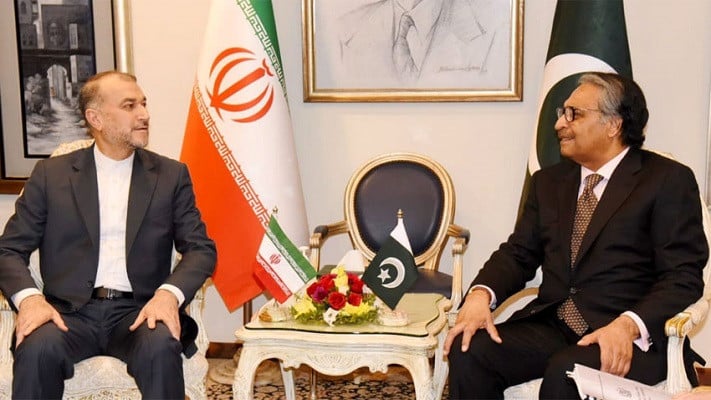On Monday, Iranian Foreign Minister Hossein Amir Abdollahian said there was “no doubt” that militants in Pakistan-Iran border regions were “led and supported by third countries”.

Abdollahian’s visit followed two weeks of unprecedented missile exchanges and the Saturday killing of nine Pakistani laborers in Sistan-Blauchistan, Iran.
In a joint press conference in Islamabad with temporary Foreign Minister Jalil Abbas Jilani, Abdollahian alleged third-party backing for terrorists along the Iran-Pakistan border.
He said “There is no doubt that the terrorists located in the common border regions and areas of Iran and Pakistan are led and supported by third countries and they never favour any good action in line with the benefits of the Iranian and Pakistani governments and nations.”
Abdollahian began his statement by saying Iran and Pakistan “never had territorial differences”. He described them as a single nation in two different locations based on their historical links.
The minister acknowledged an offer for Iranian President Ebrahim Raisi to visit Pakistan and emphasized mutual respect for sovereignty and territorial integrity. Abdollahian stressed that both nations would not allow terrorists to undermine national security.
“We are here, so in a loud voice we will tell all terrorists that Iran and Pakistan will not allow them to endanger our common security,” he said.
He said both parties committed to work quickly on border security, terrorism, and trade, commercial, and economic cooperation. The minister stressed Iran and Pakistan’s resolve to take immediate action in these areas.
High-level mechanism
Islamabad’s top diplomat said the two countries agreed to “establish a high-level constructive mechanism at the level of foreign ministers of the two countries”.
Jilani added that the mechanism will alternately meet in Iran and Pakistan “on a regular basis to oversee the progress that is being made in various areas of cooperation”.
He added that Islamabad and Tehran will “cooperate to fight terrorism in our respective areas”. “We have decided to station liaison personnel of which an agreement was already in place at the earliest date,” said the foreign minister, assigning them to Turbat and Zahedan.
Jilani said his Iranian counterpart’s “such short notice” visit shows both sides’ determination to strengthening ties. Close Pakistan-Iran relations were “not only beneficial for development but an important source of stability for the people”.
“Respect for sovereignty and integrity is the cornerstone step for cooperation,” FM Jilani said, adding that Islamabad and Tehran have agreed to “adopt collaborative methods to fight this scourge to harness the powerful institutional mechanism”.
Increased bilateral collaboration
Jilani and his Iranian counterpart discussed bilateral cooperation earlier in the day and decided to enhance relations.
The two “underscored the importance of robust dialogue and cooperation as the pathway for a positive, forward-oriented, and upward trajectory in bilateral relations” .
Islamabad and Tehran also agreed to promote peace and development through mutual respect and a joint approach to common issues.
Retaliatory missile strikes
Iran launched missile strikes on January 16 targeting Jaish-al-Adl hideouts in distant Balochistan, sparking an extraordinary military standoff. The 2012-founded Jaish-al-Adl extremist group has attacked Iranian security troops.
Pakistan responded two days later by attacking Baloch militant bases it called terrorist bases. Iran admitted the Pakistan strikes killed non-Iranian citizens.
After Pakistan retaliated, the two sides quickly deescalated. Last week, the Iranian and Pakistani embassies returned to their capitals before the foreign minister’s visit.
The two countries boast of their “friendly and brotherly” ties, yet there are issues. Mistrust of non-state actors in the border region is the main concern.
However, few predicted Iran would launch missiles in Pakistan. Officials said both sides must move slowly and agree on a new framework to prevent such occurrences.










































